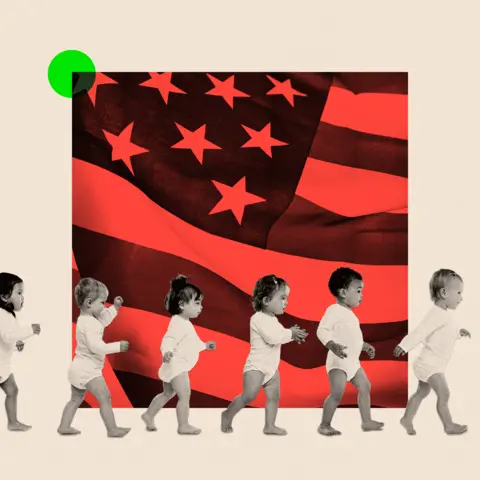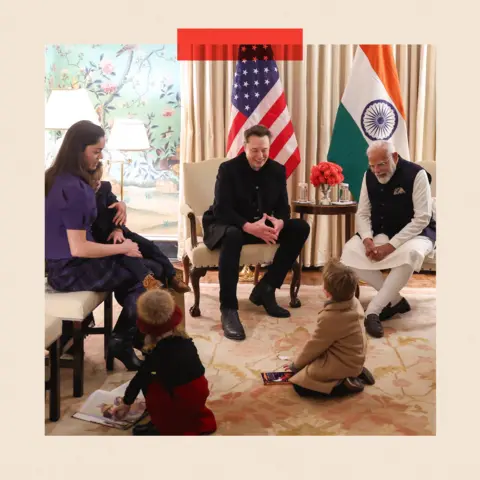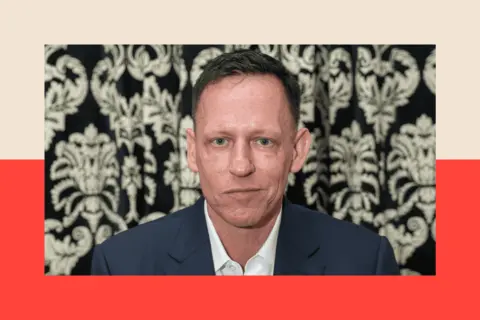The influencers who want the world to have more babies - and say the White House is on their side

 BBC
BBCPronatalists, a controversial fringe group almost exclusively from the political right, claim that some of the most powerful people in the US government are sympathetic to their cause. But how much influence do they really have?
Listen to Stephanie read this article
Simone Collins is sitting in her 18th century cottage in Pennsylvania, dressed in a black pilgrim pinafore with a wide collar, bouncing one of her four children on her lap. It is 8.30am and she looks a little tired – she runs several businesses, a foundation and is currently pregnant with her fifth child, though she and her husband Malcolm plan to have more.
"At least seven," she declares, "and as many as I can physically carry - 12 would be even more brilliant."
The US couple, aged 37 and 38, ardently believe that the world needs to have more babies or risk civilisational collapse. They have become the poster children for pronatalism, a movement that believes falling birth rates are a big problem for society. And that big families are the answer.
For the last five years, they have spread the word about their goal by opening up their home for interviews and photoshoots. They claim to have used special technology, during the IVF process, to screen their embryos for traits such as intelligence.
"The studies let us know what our genetic predilection for IQ is," they told an undercover reporter in 2023. "We will never choose a child who is less privileged in IQ than either of us."

Speaking today, however, Malcolm admits, "The easiest way to [spread the word about pronatalism] was to turn ourselves into a meme... If we take a reasonable approach to things and say things are nuanced, nobody engages. And then we go and say something outrageous and offensive and everyone's into it."
But since Donald Trump was sworn in as US President for the second time earlier this year, they have taken their evangelising to a new level. The Collinses now see certain people in the White House as potential allies - and they fully intend to capitalise on that.
Elon Musk, who is said to have fathered 14 children, has called fertility decline "the biggest danger civilisation faces, by far". He has donated $10m (£7.75m) to the Population Wellbeing Initiative in Texas, which conducts research into fertility, parenting, and the future of population growth.
The US Vice President JD Vance has also spoken openly about his views on procreation. At an anti-abortion rally in January he declared: "I want more babies in the United States of America."
There are early indications that the Trump administration is prioritising family too. On 18 February, Trump signed an executive order to improve access for IVF that recognised "the importance of family formation and that our nation's public policy must make it easier for loving and longing mothers and fathers to have children".
Pronatalists are buoyed by this and many hope it is a sign of things to come.
 Getty Images
Getty ImagesThe facts of fertility decline are clear. The US is at a record low of 1.62 children per woman, and by the end of the century the UN projects a majority of countries will have a shrinking population. That will have a profound effect on society and our economies. Some people believe we can adapt over time to this new reality, but pronatalists are less sanguine.
But there is a political element to the movement too. Pronatalists are almost exclusively from the political right. Malcolm and Simone Collins, for example, describe themselves as former liberals who became disillusioned with progressive, "woke" politics.
They see themselves as pragmatic and profoundly anti-bureaucratic.
"We are a coalition of people who are incredibly different in our philosophies, our theological beliefs, our family structures," says Malcolm. "But the one thing we agree on is that our core enemy is the urban monoculture; the leftist unifying culture."
So, could this fringe group really gain the ear of some of the most powerful people in the US government? And if so, just how much soft power could they have to influence policy not only around population decline but about wider issues too?
Vance, Musk and the 'Fertilisation President'
Last weekend, a group of roughly 200 pronatalists congregated in Texas for the second Natal Conference, an annual weekend-long event that cost around $1,000 (£775) to attend.
The conference brings together two strands in pronatalism that come from very different branches of the American right: both conservative Christians and members of the so-called 'tech right,' an ascendant wing that came out of the libertarian, start-up culture of Silicon Valley.
Some are connected to the current US government. Michael Anton was appointed by Trump as the Director of Policy Planning at the State Department. He spoke at last year's conference.
Other speakers at this year's conference included Carl Benjamin, who has links to far-right activist Tommy Robinson, and Charles Cornish-Dale, an influencer who goes by the name Raw Egg Nationalist.
"It's like an unholy alliance," says Catherine Pakaluk, an economist, mother of eight and stepmother of six. She too spoke at the conference but is reluctant to call herself a pronatalist. "It's a complicated movement and includes people with very different positions," she says.
One thing they have in common, however, is that they all want their message to be heard at the highest levels of government.
Some believe they already are being heard. "[If you ask me] do we have pronatalists in the White House right now who are pushing policy," says Malcolm, "my response to this would be, 'I mean, duh, like Elon and JD Vance'."
 Getty Images
Getty ImagesIn President Trump's executive orders to date, there has been little apart from the order on IVF that could be seen as directly pro-family. But pronatalist thinking may be starting to influence policy that is less explicitly about fertility.
In January, the US transportation secretary Sean Duffy circulated a memo instructing his department to "give preference to communities with marriage and birth rates higher than the national average" when awarding grants.
Roger Severino, Vice-President of Domestic Policy at right-wing think tank the Heritage Foundation, sees the influence of JD Vance in that policy. "Vance comes at it from a long history of pro-family thinking and policymaking," he says.
Vance has often spoken about the need to fix a "broken culture" that is tearing the US family apart, by undermining men.
In a recent interview, he said: "We actually think God made male and female for a purpose and we want you guys to thrive as young men and young women and we're going to help with our public policy to make it possible to do that."
This idea has been echoed in pronatalist circles.
"Vance is a vocal pronatalist," says Rachel Cohen, policy correspondent at Vox. "Trump himself campaigned on implementing a new "baby boom" and last week he declared himself the 'fertilisation president'."
The pronatalists drafting DIY executive orders
Malcolm says he has already made attempts to influence the White House. He claims to have engaged in "backroom channelling of influential people, making sure that pronatalism became normal to talk about within the centres of power, and that ended up dripping its way up to administration and core tech culture".
They are in discussions on pronatalist policy with the Heritage Foundation. Then there is a rather more direct approach they claim to have taken. "We have submitted draft executive orders to the Trump administration," says Simone.
Their proposals include suggestions for how to remove layers of regulation from childcare providers and expanding car seat choice so cars can fit more children.
The couple aren't sure if those are going to translate into anything concrete just yet – but they believe they have a receptive audience.
Their connection to power is thanks to the so-called tech right, a reactionary movement against liberalism led by some of the most powerful people in Silicon Valley. Those in the tech right include Paypal co-founder Peter Thiel – who sponsored Vance's Senate race and has invested in fertility technology – and venture capitalists David Sacks and Marc Andreessen.
 Getty Images
Getty ImagesSimone Collins was formerly the managing director of an exclusive members' club run by Mr Thiel, and the couple say they ran two other invite-only networking groups for business elites. Their Pronatalist Foundation, founded in 2021, received just under $500,000 (£387,000) through a fund of the Skype co-founder, Estonian billionaire Jann Tallinn.
"The tech right bring a lot of energy to the discussion," says Roger Severino, Vice-President of Domestic Policy at the Heritage Foundation. "We've been discussing how we could blend these various strains on the right. We're trying to cohere the movement."
Cracks in the pronatalist alliance
There are, however, cracks in the alliance which add to the challenge of trying to make the movement “coherent”.
Many on the traditional religious right have misgivings about the use of IVF and disagree with embryo screening, while some also oppose gay marriage and parenthood.
"It's just an odd alliance of people who seem to agree on this one point: that the birth rate is too low. But there are wildly different prescriptions and ideas about what might be done to fix it," says Ms Pakaluk.
"There's a renewed interest in pronatalism and family promotion among American conservatives," says Timothy Carney, author of Family Unfriendly, How our Culture Made Raising Kids Much Harder than it Needs to Be. But he adds: "There will definitely be tensions."
 Getty Images
Getty ImagesOne of those most divisive issues in pronatalism are the mention of certain aspects related to genetics among some of its tech right proponents. It's something that has prompted concern, in particular around the ethics of this, on all sides of the political spectrum.
Patrick T Brown, a fellow at the right-leaning American Ethics and Public Policy Centre working on pro-family policy, suggests that the executive order to improve access to IVF could show the influence of the tech-right on policy. But he has his concerns about that influence, particularly around embryo screening. "Turning children into consumer products is something that I really worry about," he says. "That leads to a troublesome place."
Some of those attending the recent conference describe themselves as "race realists", and one has published offensive views alleging a link between intelligence and race that, according to many scientists, are plain wrong.
Geneticist Adam Rutherford describes the data used as "fraudulent and racist, drawn from hopeless sample sizes that wouldn't constitute valid scientific evidence to anyone vaguely interested in truth.
"These assertions are recapitulations of historical ideas of scientific racism."
The associations with extreme views in the movement is one of the reasons some people don't like to call themselves pronatalists. Catherine Pakaluk is one of them. "I think there probably are some people who are just pure eugenicists or white supremacists," she says.
"I find it disgusting and reprehensible and I have no interest in ever being aligned with people like that."
Could controversy translate into soft power?
The question that remains is, where does all of this leave pronatalists - and just how much power do they wield?
According to some onlookers, their impact is already being felt. "There's definitely strong influence from pronatalists in the Trump White House," claims Ms Cohen. "I think an outstanding question is how this will all overlap with efforts to restrict birth control and contraception, and how this will affect debates around spending like on childcare funding."
Mr Carney is more circumspect: "Vance is very pro-family and very pronatalist, and he wants the government to promote families and to help drive up the birth rate - but JD Vance is not the president. I don't think Donald Trump has firm conviction on this."
 Getty Images
Getty ImagesHe also believes there might be resistance to some pro-family policies, pointing out that at least some of the Republicans in control of Congress don't like the idea of family support. "They think that it's welfare to the undeserving."
The attention gleaned by the Collinses, and by the recent conference, is undoubtable. But one expert suggests they are doing little more than stirring up controversy.
"If you go to Capitol Hill, and talk to members of Congress or governors in states across America, they don't necessarily even recognise the problem," argues Mr Brown.
As he puts it, "the incentives of the internet" aren't always the incentives of a successful mass movement. "And what gets attention is provocation and being edgy and crossing the line. That gets clicks, that gets followers.
"[But] that to me is not how you end up changing the political dynamics."
Top picture credit: Getty Images
BBC InDepth is the home on the website and app for the best analysis, with fresh perspectives that challenge assumptions and deep reporting on the biggest issues of the day. And we showcase thought-provoking content from across BBC Sounds and iPlayer too. You can send us your feedback on the InDepth section by clicking on the button below.
